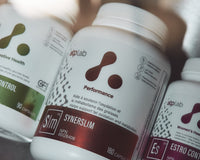Vitamin D: Needed or Overused?
Vitamin D has been a hot topic for years and it is no coincidence. According to a variety of research, this vitamin, once metabolized, has a wide range of benefits for human health. But is it as beneficial as we think?
First of all, it is important to remember what vitamin D3 is. Vitamin D is one of the fat-soluble vitamins, and its main indirect source is sunlight. The sun's UVB rays modify a cholesterol-like molecule, 7-dehydrocholesterol, to produce Vitamin D. Thirty minutes of unprotected exposure can provide between 10,000 and 20,000 IU, which is a very good dose. The body also has a mechanism that prevents excessive metabolism. As you can imagine, vitamin D metabolism is not straightforward. It takes more than exposure to sunlight to achieve an optimal blood level of vitamin D. Of course, you can get vitamin D from food, but it is quite difficult to fill the gap. A 100-g sardine tin contains 480 IU and 100 g butter, 56 IU. So you would need quite a specific diet to get more than 1000 IU a day.
Let's talk about the properties of vitamin D3. According to various research and articles, it protects against certain types of cancer, increases insulin sensitivity, reduces symptoms and/or the progression of certain autoimmune diseases and plays a role in depression. Its best known role is in increasing the immune function to protect against infections, such as colds and flu. As for cancer, a meta-analysis has shown that there is a positive correlation between vitamin D and cancer, and that a blood level of over 75 nmol/L significantly reduces the risk of mortality in people with colorectal and breast cancer. This has also been observed in several other meta-analyses. With respect to its role in insulin sensitivity and diabetes, vitamin D3 shines again. According to a study carried out on overweight children, supplementation of 300,000 IU over a three-month period increases insulin sensitivity. Several other studies confirm that a low blood level of vitamin D is linked to poor insulin sensitivity and type 2 diabetes. For autoimmune diseases, such as lupus, multiple sclerosis, rheumatoid arthritis and many others, a higher blood level of vitamin D is inversely proportional to the risk of developing some of these diseases, and a pharmacological dose of vitamin D3 could, in some cases, reduce symptoms and progression. With respect to its immunomodulatory role, vitamin D3, has proved its effectiveness. Adequate supplementation of vitamin D3 helps lower the frequency of flu infection. Evidence with regards to colds, however, is inconclusive.
We have reviewed many of the properties attributed to vitamin D, and most, in my opinion, are very conclusive. Of course, this vitamin alone cannot cure cancer or any other diseases. But an adequate intake of vitamin D and the maintenance of an optimal blood level of vitamin D is a very good way of optimizing your health and minimizing your chances of developing a wide range of diseases.
First of all, it is important to remember what vitamin D3 is. Vitamin D is one of the fat-soluble vitamins, and its main indirect source is sunlight. The sun's UVB rays modify a cholesterol-like molecule, 7-dehydrocholesterol, to produce Vitamin D. Thirty minutes of unprotected exposure can provide between 10,000 and 20,000 IU, which is a very good dose. The body also has a mechanism that prevents excessive metabolism. As you can imagine, vitamin D metabolism is not straightforward. It takes more than exposure to sunlight to achieve an optimal blood level of vitamin D. Of course, you can get vitamin D from food, but it is quite difficult to fill the gap. A 100-g sardine tin contains 480 IU and 100 g butter, 56 IU. So you would need quite a specific diet to get more than 1000 IU a day.
Let's talk about the properties of vitamin D3. According to various research and articles, it protects against certain types of cancer, increases insulin sensitivity, reduces symptoms and/or the progression of certain autoimmune diseases and plays a role in depression. Its best known role is in increasing the immune function to protect against infections, such as colds and flu. As for cancer, a meta-analysis has shown that there is a positive correlation between vitamin D and cancer, and that a blood level of over 75 nmol/L significantly reduces the risk of mortality in people with colorectal and breast cancer. This has also been observed in several other meta-analyses. With respect to its role in insulin sensitivity and diabetes, vitamin D3 shines again. According to a study carried out on overweight children, supplementation of 300,000 IU over a three-month period increases insulin sensitivity. Several other studies confirm that a low blood level of vitamin D is linked to poor insulin sensitivity and type 2 diabetes. For autoimmune diseases, such as lupus, multiple sclerosis, rheumatoid arthritis and many others, a higher blood level of vitamin D is inversely proportional to the risk of developing some of these diseases, and a pharmacological dose of vitamin D3 could, in some cases, reduce symptoms and progression. With respect to its immunomodulatory role, vitamin D3, has proved its effectiveness. Adequate supplementation of vitamin D3 helps lower the frequency of flu infection. Evidence with regards to colds, however, is inconclusive.
We have reviewed many of the properties attributed to vitamin D, and most, in my opinion, are very conclusive. Of course, this vitamin alone cannot cure cancer or any other diseases. But an adequate intake of vitamin D and the maintenance of an optimal blood level of vitamin D is a very good way of optimizing your health and minimizing your chances of developing a wide range of diseases.
- Schöttker B, Ball D, Gellert C, Brenner H. Serum 25-hydroxyvitamin D levels and overall mortality. A systematic review and meta-analysis of prospective cohort studies. Ageing Res Rev. 2013 Mar;12(2):708-18. doi:
- 10.1016/j.arr.2012.02.004. Epub 2012 Feb 17. Review. PubMed PMID: 22343489.
- Bauer SR, Hankinson SE, Bertone-Johnson ER, Ding EL. Plasma vitamin D levels, menopause, and risk of breast cancer: dose-response meta-analysis of prospective studies. Medicine (Baltimore). 2013 May;92(3):123-31. doi:10.1097/MD.0b013e3182943bc2. Review. PubMed PMID: 23625163; PubMed Central PMCID:PMC4553988.
- Maalmi H, Ordóñez-Mena JM, Schöttker B, Brenner H. Serum 25-hydroxyvitamin Dlevels and survival in colorectal and breast cancer patients: systematic reviewand meta-analysis of prospective cohort studies. Eur J Cancer. 2014May;50(8):1510-21. doi: 10.1016/j.ejca.2014.02.006. Epub 2014 Feb 28. Review.PubMed PMID: 24582912.
- Heaney, Robert P., "The Vitamin D requirement in health and disease," Journal of Steroid Biochemistry & Molecular Biology, 97 (2005)13-19.
- Engelsen, et al., "Symposium-in-Print: UV Radiation, Vitamin D and Human Health: An Unfolding Controversy: Daily Duration of Vitamin D Synthesis in Human Skin with Relation to Latitude Total Ozone, Altitude, Ground Cover, Aerosols and Cloud Thickness," Photochemistry and Photobiology, 81 (2005) 1287-1290.
- Cannel, MD, John Jacob, "The Truth About Vitamin D Toxicity," http://www.vitamindcouncil.com/vitaminDToxicity.shtml. Published September 4, 2003. Accessed May 24, 2006.
- http://www.medscape.com/viewarticle/823900
- Roya Kelishadi, ShadiSalek, Mehdi Salek, MahinHashemipour, MahsaMovahedian
- Effects of vitamin D supplementation on insulin resistance and cardiometabolic risk factors in children with metabolic syndrome: a triple-masked controlled trial
- Jornal de Pediatria (VersãoemPortuguês), Volume 90, Issue 1, January–February 2014, Pages 28-34
- USDA Nutrient Facts, Standard Release 17, http://www.nal.usda.gov/fnic/foodcomp/Data/SR17/wtrank/sr17a601.pdf and vitamin D facts are from Sullivan, Krispin, "The Miracle of Vitamin D," http://www.westonaprice.org/basicnutrition/vitamindmiracle.html#food Accessed May 24, 2006.
- Abou-Raya A, Abou-Raya S, Helmii M. The effect of vitamin D supplementation on inflammatory and hemostatic markers and disease activity in patients with systemic lupus erythematosus: a randomized placebo-controlled trial. J Rheumatol. 2013 Mar;40(3):265-72. doi: 10.3899/jrheum.111594. Epub 2012 Dec 1. PubMed PMID: 23204220. Petri M, Bello KJ, Fang H, Magder LS. Vitamin D in systemic lupuserythematosus: modest association with disease activity and the urineprotein-to-creatinine ratio. Arthritis Rheum. 2013 Jul;65(7):1865-71. doi: 10.1002/art.37953. PubMed PMID: 23553077; PubMed Central PMCID: PMC3701725.
- Munger KL, Levin LI, Hollis BW, Howard NS, Ascherio A. Serum 25-Hydroxyvitamin D Levels and Risk of Multiple Sclerosis. JAMA. 2006;296(23):2832-2838. doi:10.1001/jama.296.23.2832.
- Adzemovic MZ, Zeitelhofer M, Hochmeister S, Gustafsson SA, Jagodic M. Efficacy of vitamin D in treating multiple sclerosis-like neuroinflammation depends on developmental stage. Exp Neurol. 2013 Nov;249:39-48. doi:10.1016/j.expneurol.2013.08.002. Epub 2013 Aug 13. PubMed PMID: 23954214.
- Ascherio A, Munger KL, White R, Köchert K, Simon KC, Polman CH, Freedman MS,Hartung HP, Miller DH, Montalbán X, Edan G, Barkhof F, Pleimes D, Radü EW, Sandbrink R, Kappos L, Pohl C. Vitamin D as an early predictor of multiple sclerosis activity and progression. JAMA Neurol. 2014 Mar;71(3):306-14. doi: 10.1001/jamaneurol.2013.5993. PubMed PMID: 24445558; PubMed Central PMCID:PMC4000029. Holmøy T, Torkildsen Ø, Myhr KM, Løken-Amsrud KI. Vitamin D supplementation and monitoring in multiple sclerosis: who, when and wherefore. ActaNeurolScand Suppl. 2012;(195):63-9. doi: 10.1111/ane.12028. PubMed PMID: 23278659.
- https://www.researchgate.net/profile/Linda_Merlino/publication/241385401_Vitamin_D_Intake_Is_Inversely_Associated_With_Rheumatoid_Arthritis/links/00b7d53cd1e9d4500e000000.pdf
- Vitamin D Intake Is Inversely Associated WithRheumatoid Arthritis
- Results From the Iowa Women’s Health Study
- Linda A. Merlino,JeffreyCurtis,Ted R. Mikuls,James R. Cerhan,Lindsey A. Criswell,and Kenneth G. Saag
- Dehghan A, Rahimpour S, Soleymani-Salehabadi H, Owlia MB. Role of vitamin D in flare ups of rheumatoid arthritis. Z Rheumatol. 2014 Jun;73(5):461-4. doi:10.1007/s00393-013-1297-4. PubMed PMID: 24352479.
- Neve A, Corrado A, Cantatore FP. Immunomodulatory effects of vitamin D in peripheral blood monocyte-derived macrophages from patients with rheumatoid arthritis. ClinExp Med. 2014 Aug;14(3):275-83. doi: 10.1007/s10238-013-0249-2.Epub 2013 Jul 4. PubMed PMID: 23824148.
- Urashima M, Segawa T, Okazaki M, Kurihara M, Wada Y, Ida H. Randomized trial of vitamin D supplementation to prevent seasonal influenza A in schoolchildren. Am J ClinNutr. 2010 May;91(5):1255-60. doi: 10.3945/ajcn.2009.29094. Epub 2010Mar 10. PubMed PMID: 20219962.
- http://www.nature.com/nri/journal/v8/n9/fig_tab/nri2378_F2.html
- Schwalfenberg G. Vitamin D for influenza. Canadian Family Physician. 2015;61(6):507.
- Adorini L, Penna G. Induction of tolerogenic dendritic cells by vitamin Dreceptor agonists. HandbExpPharmacol. 2009;(188):251-73. doi:10.1007/978-3-540-71029-5_12. Review. PubMed PMID: 19031030.





